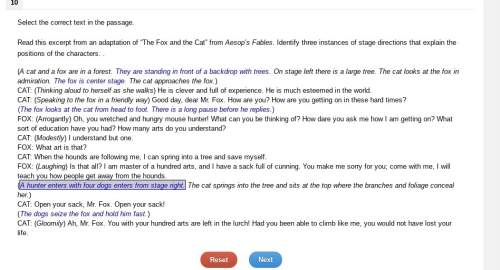
English, 31.01.2020 17:01 nicollexo21
Read this excerpt from an adaptation of “the fox and the cat” from aesop’s fables. identify three instances of stage directions that explain the positions of the characters.
(a cat and a fox are in a forest. they are standing in front of a backdrop with trees. on stage left there is a large tree. the cat looks at the fox in admiration. the fox is center stage. the cat approaches the fox.)
cat: (thinking aloud to herself as she walks) he is clever and full of experience. he is much esteemed in the world.
cat: (speaking to the fox in a friendly way) good day, dear mr. fox. how are you? how are you getting on in these hard times?
(the fox looks at the cat from head to foot. there is a long pause before he replies.)
fox: (arrogantly) oh, you wretched and hungry mouse hunter! what can you be thinking of? how dare you ask me how i am getting on? what sort of education have you had? how many arts do you understand?
cat: (modestly) i understand but one.
fox: what art is that?
cat: when the hounds are following me, i can spring into a tree and save myself.
fox: (laughing) is that all? i am master of a hundred arts, and i have a sack full of cunning. you make me sorry for you; come with me, i will teach you how people get away from the hounds.
(a hunter enters with four dogs enters from stage right. the cat springs into the tree and sits at the top where the branches and foliage conceal her.)
cat: open your sack, mr. fox. open your sack!
(the dogs seize the fox and hold him fast.)
cat: (gloomily) ah, mr. fox. you with your hundred arts are left in the lurch! had you been able to climb like me, you would not have lost your life


Answers: 3


Another question on English

English, 21.06.2019 15:30
Stone, two or three feet thick, the door of wood and iron, a foot thick, and the iron grating which strained the light, i could not being struck with the foolishness of that institution which treated me as if i were mere flesh and blood and bones, to be locked up. i wondered that it should have concluded at length that this was the best use it could put me to, and had never thought to avail itself of my services in some way. i saw that, if there was a wall of stone between me and my townsmen, there was a still more difficult one to climb or break through before they could get to be as free as i was. i did not for a moment feel confined, and the walls seemed a great waste of stone and mortar. i felt as if i alone of all my townsmen had paid my tax. — “civil disobedience,” henry david thoreau based on this passage, how did thoreau feel about his confinement?
Answers: 1

English, 21.06.2019 22:00
Diego rivera was a famous artist from mexico. most of his paintings were murals. murals are paintings that are made directly on a wall. rivera thought that all people should be able to see beautiful art, not just people who could afford to go to museums. this is why he painted most of his murals on the walls of public buildings
Answers: 3

English, 22.06.2019 00:30
"the children's hour" by henry wadsworth longfellow between the dark and the daylight, when the night is beginning to lower, comes a pause in the day's occupations, that is known as the children's hour. i hear in the chamber above me the patter of little feet, the sound of a door that is opened, and voices soft and sweet. from my study i see in the lamplight, descending the broad hall stair, grave alice, and laughing allegra, and edith with golden hair. a whisper, and then a silence: yet i know by their merry eyes they are plotting and planning together to take me by surprise. a sudden rush from the stairway, a sudden raid from the hall! by three doors left unguarded they enter my castle wall! they climb up into my turret o'er the arms and back of my chair; if i try to escape, they surround me; they seem to be everywhere. they almost devour me with kisses, their arms about me entwine, till i think of the bishop of bingen in his mouse-tower on the rhine! do you think, o blue-eyed banditti, because you have scaled the wall, such an old mustache as i am is not a match for you all! i have you fast in my fortress, and will not let you depart, but put you down into the dungeon in the round-tower of my heart. and there will i keep you forever, yes, forever and a day, till the walls shall crumble to ruin, and moulder in dust away! which literary device does longfellow use most frequently in the poem? a. simile b. metaphor c. repetition d. personification
Answers: 2

You know the right answer?
Read this excerpt from an adaptation of “the fox and the cat” from aesop’s fables. identify three in...
Questions

Mathematics, 17.12.2020 23:10


Advanced Placement (AP), 17.12.2020 23:10

English, 17.12.2020 23:10




Mathematics, 17.12.2020 23:10


Mathematics, 17.12.2020 23:10


English, 17.12.2020 23:10

Chemistry, 17.12.2020 23:10

English, 17.12.2020 23:10


Mathematics, 17.12.2020 23:10

History, 17.12.2020 23:10



Business, 17.12.2020 23:10



